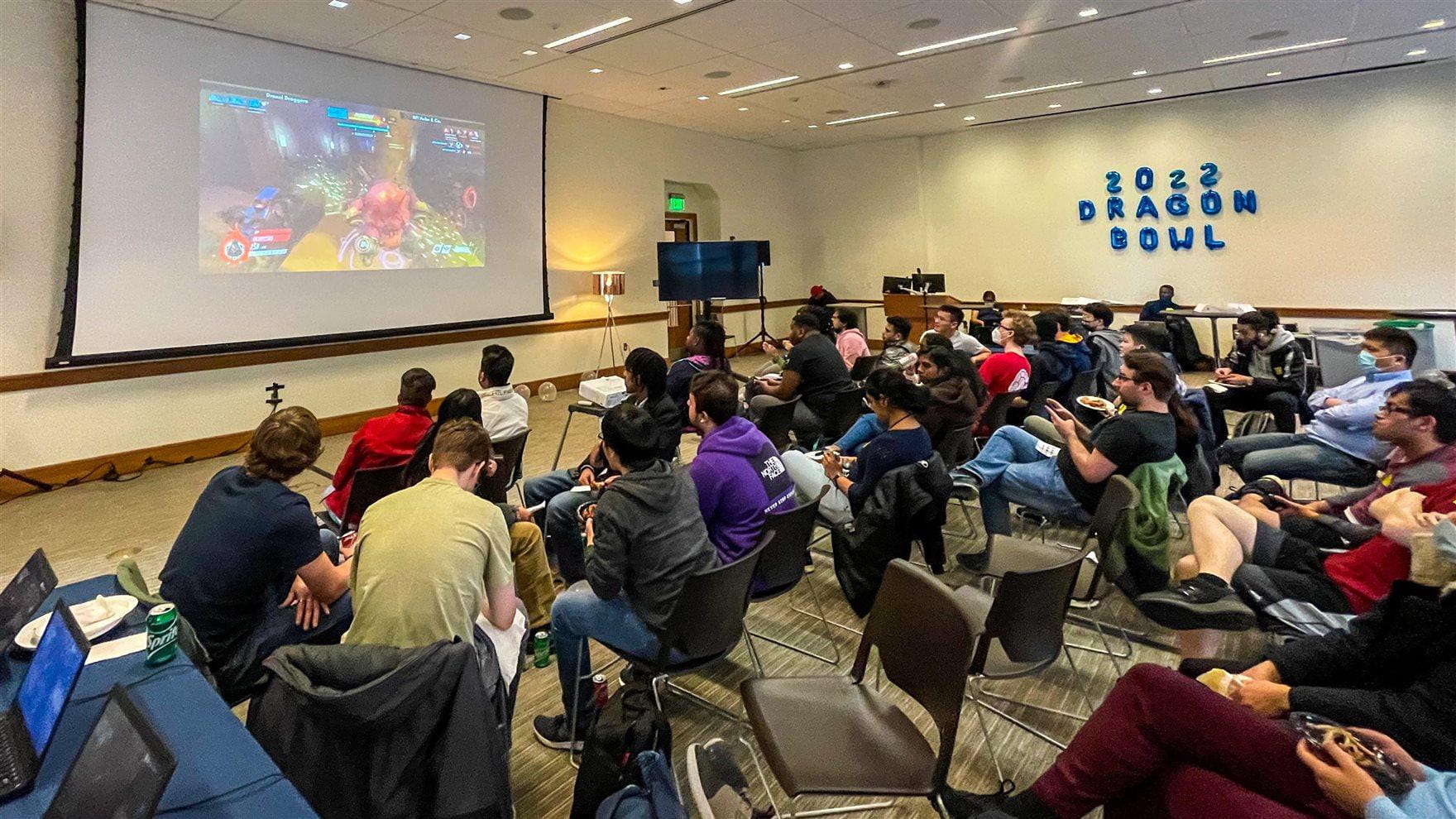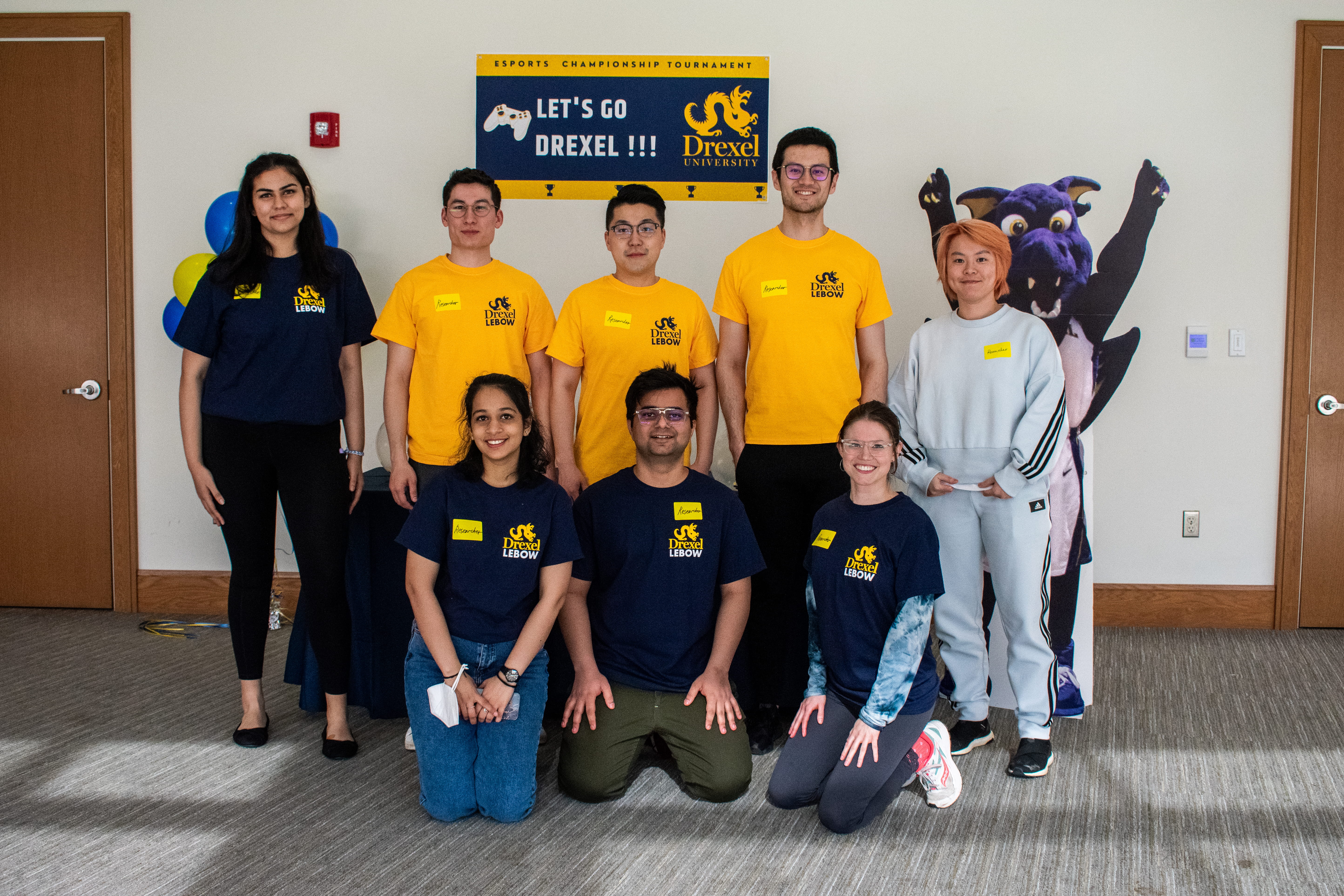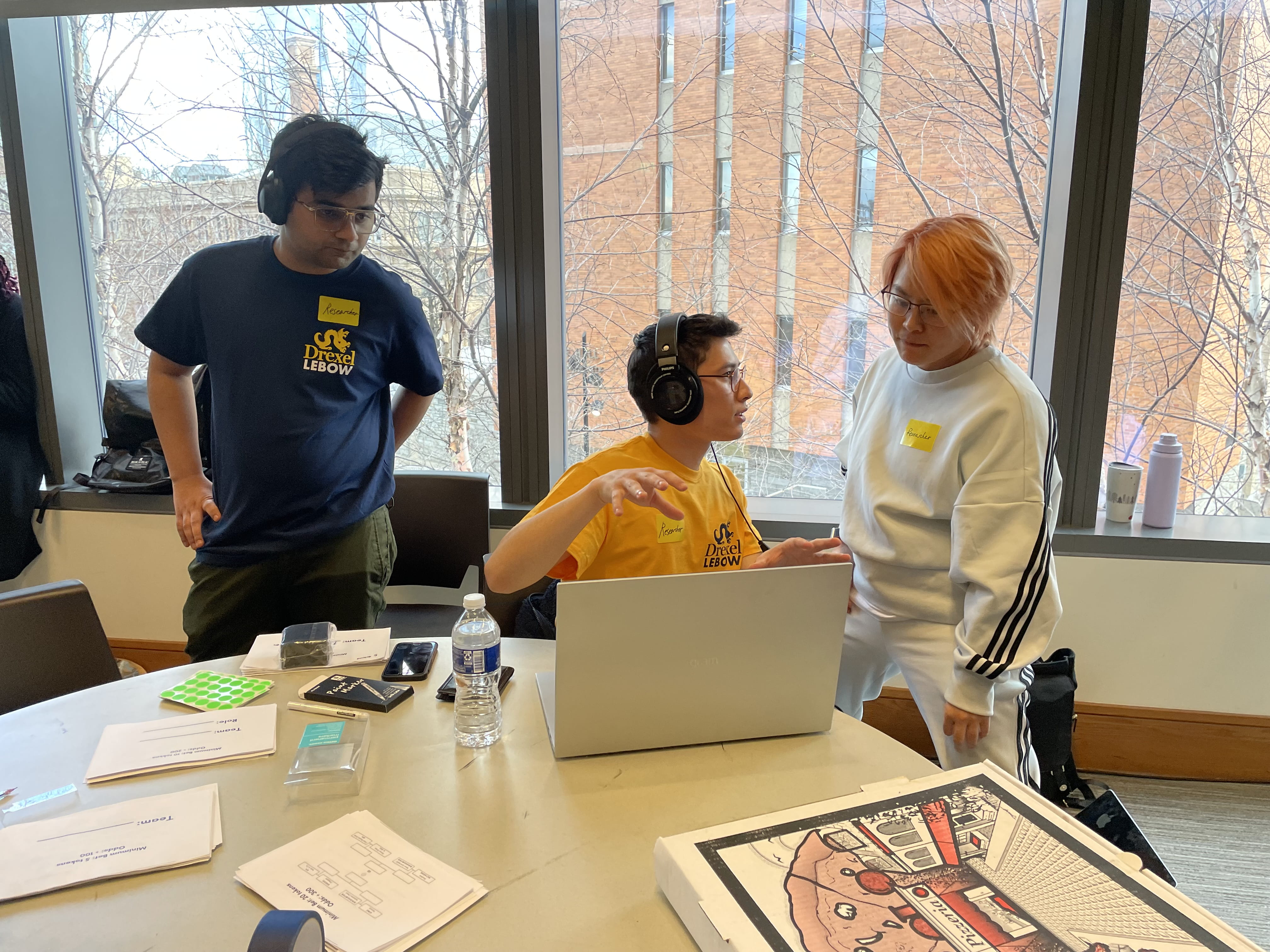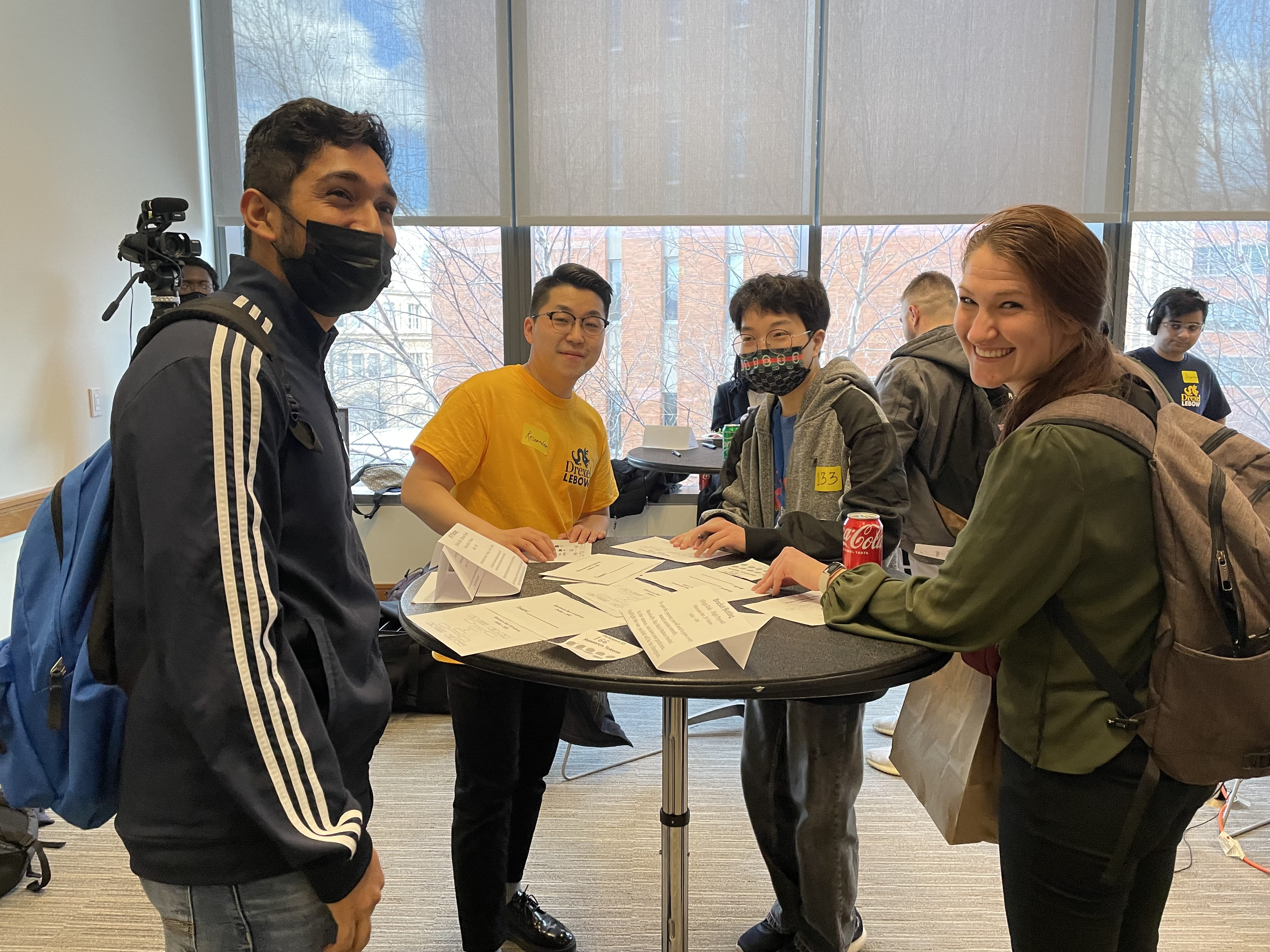Inaugural Dragon Bowl Tournament Levels Up Drexel Research and eSports

More than 100 people, mostly Drexel students and faculty, filled a room in Gerri C. LeBow Hall on April 1, all intently watching the screen. It was the first week of spring classes, but this wasn’t an evening lecture.
They gathered to watch the finals of the first-ever Dragon Bowl eSports Tournament, an intercollegiate Overwatch tournament hosted by the Drexel Solutions Institute as an extension of an esports project with Comcast. The event was also supported by Drexel’s Division of Enrollment Management and Student Success and Senior Vice President for Student Success Subir Sahu, PhD. The final tournament was broadcast on Twitch with professional eSports broadcasting and production team (Ethan “LordThethan” Blackmon, Joel “Guthix” Harvey, Sam “Saxamego” Eldridge).
Led by Senior Vice Provost for Academic-Industry Partnerships Rajneesh Suri, PhD, and Provost Solutions Fellow Lauren D’Innocenzo, PhD, the tournament was run by recent PhD graduate Hongjun Ye and current business administration doctoral students Madison Miller and Youngdai Won, with assistance from undergraduate and graduate students.
Sixty teams from nearly 30 universities in the United States and Canada competed in two regional tournaments for the final eight seeds. Drexel Draggers (Christopher “Hitscan” Ku, Aron “JeffGoldblum” Feller, Kieran “Peanut” Conroy) was one of the final eight. Delaware Savvix Simps (Zachary “HYPER” Witte, Emilio “ShoddyPod” Obregon, Nathan “Nate12” Lax) won the tournament.

This was not just any eSports tournament, though. True to the Drexel Solutions Institute mission to connect industry with the Drexel community to solve real-world problems, the Dragon Bowl was unique in that it served as a research platform to study the emerging eSports industry.
“We can do a lot of different studies if we create a platform like this,” Suri said. “It’s like creating a field experiment where several research studies from different researchers can be implemented at the same time.
“Think of it like you created a mock store where different researchers could test their hypothesis. I think it’s a novel way of moving research forward in eSports.”
One end of their research focused on the participants from an organizational behavior lens. Overwatch, a team-based multiplayer first-person shooter game, provided a valuable avenue to conduct research on team processes.

“A nice thing about Overwatch is that it has very clear roles,” Ye said. “You have the damage, the tank, the support. When you think about it like a workplace, it’s actually pretty similar.”
“When teams operate together, there is a transition stage and an action stage, then there’s an interpersonal stage operating throughout,” Miller said. “We wanted to see how these processes work, and if they matter more at certain points.
“We’re also interested in team members’ individual traits. Are they interested in being the team builder and encourager, or are they more of a challenger or a doer? We wanted to see how team composition affects teams throughout a real challenge.
The other end focused on consumer behavior, like motivations for attending and viewer experience. As the eSports industry grows — especially in the Philadelphia area with the emergence of the Philadelphia Fusion professional Overwatch League team — learning how fans interact with the sport is critical for companies marketing to eSports audiences.

“We wanted to investigate consumer behavior at the psychological level,” Won said. “We believe this information could help decision makers identify customer needs and determine how to best meet those needs, like by exposing their advertisements to consumers in the right place at the right moment.”
For now, there are high-level results — respondents overwhelmingly said the well-orchestrated event made “people feel good about being part of Drexel,” Ye said — and anecdotal observations (several prospective students noted the tournament may lead them to choose Drexel). Many of the findings remain preliminary, though, with deeper analysis of the data to be done. The research team hopes to begin writing a manuscript later this year, with hopes of future publication.
With the first Dragon Bowl deemed a success, Suri and the team look forward to building the tournament further as a research platform. They hope to not only hold another Dragon Bowl, but that other universities conduct their own research-based tournaments to move the study of eSports forward.
“We’re pushing the envelope as an institute to look at cutting-edge problems by bringing not only industry into fray but also students and faculty,” Suri said. “We’re addressing these problems in a more forward-looking manner rather than getting tied down with the traditional academic frameworks.
“We’re trying to break that mold, and we’re doing this to move the institution forward, move the learning forward for our students, move the research forward for the faculty, and move the industry forward. That’s the whole purpose of the Drexel Solutions Institute.”
The full list of participating universities and colleges that competed alongside Drexel:
- Binghamton University
- Carleton University
- Central Michigan University
- Clarkson University
- Columbia University
- Cornell University
- Eastern Michigan University
- George Mason University
- Grand Valley State University
- Kean University
- New Jersey Institute of Technology
- Northcentral Technical College
- Rensselaer Polytechnic Institute
- Roger Williams University
- Rutgers University
- South Dakota School for Mines & Technology
- Stockton University
- Stony Brook University
- SUNY Morrisville
- SUNY Polytechnic Institute
- University of Buffalo
- University of Connecticut
- University of Delaware
- University of New Hampshire
- University of Rhode Island
- University of Toronto
- University of Wisconsin Whitewater
This story was written by Kevin Rossi.
In This Article
Drexel News is produced by
University Marketing and Communications.